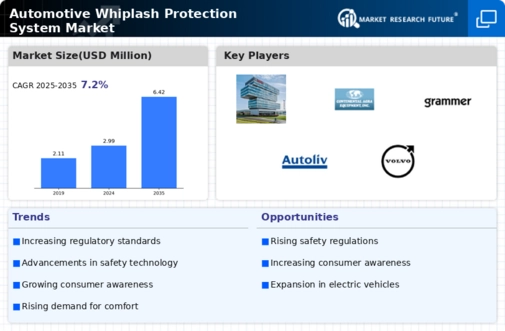Top Industry Leaders in the Automotive Whiplash Protection System Market
*Disclaimer: List of key companies in no particular order
Top listed companies in the Automotive Whiplash Protection System industry are:
Robert Bosch (Germany), Delphi Automotive (UK), Hyundai Mobis (South Korea), Continental AG (Germany), Grammer AG (Germany), Autoliv Inc.(Sweden), Lear Corporation (US), Takata Corporation (Japan), Volvo Group (Sweden)
Competitive Landscape of Automotive Whiplash Protection System Market: Key Players, Strategies, and Trends
The global automotive whiplash protection system (WPS) market boasts a steady growth trajectory, fueled by rising safety concerns, stringent regulations, and technological advancements. Navigating this dynamic landscape requires a close look at the key players, their strategies, and the emerging trends shaping their competition.
Key Players and Strategies:
Established Brands: Leading the pack are established players like Autoliv Inc., Hyundai Mobis Co. Ltd., and Ningbo Joyson Electronic Corp. These companies leverage their extensive experience, robust R&D capabilities, and strong partnerships with major automakers to maintain market share. Autoliv, for instance, focuses on active head restraints with sensors and actuators, while Hyundai Mobis is exploring integrated seat-headrest systems.
Regional Players: Regional players like Grammer AG, Adient PLC, and Faurecia are carving their niche by catering to specific regional demands and cost-effectiveness. Grammer, for example, excels in adjustable headrests catering to diverse passenger physiques, while Adient focuses on budget-friendly WPS solutions for emerging markets.
Technology Innovators: Smaller, technology-driven startups are disrupting the market with innovative approaches. Companies like Whiplash Prevention System (WPS) are developing next-generation systems using advanced materials and biomechanics principles. Others, like CTech Development, are focusing on integration with advanced driver-assistance systems (ADAS) for predictive whiplash protection.
Market Share Analysis Factors:
Technology & Performance: The effectiveness of WPS in reducing whiplash injuries remains a crucial factor. Companies with systems demonstrating superior performance in crash tests and real-world scenarios gain an edge.
Cost & Value Proposition: Balancing cost with effectiveness is key, especially in price-sensitive markets. Budget-friendly solutions with proven efficacy attract automakers and budget-conscious consumers.
Regulatory Compliance: Stringent safety regulations in regions like Europe and North America drive demand for advanced WPS. Players compliant with these regulations gain wider market access.
Partnerships & Collaborations: Strong partnerships with automakers and tier-1 suppliers provide significant market access and influence purchase decisions. Strategic collaborations with research institutions and safety organizations further enhance brand credibility.
Emerging Trends and Competitive Scenario:
Advanced Technologies: Integration of sensors, actuators, and AI-powered algorithms is transforming WPS into active systems capable of pre-collision adjustments and real-time injury mitigation.
Personalization & Customization: Personalized headrests and seat adjustments based on individual passenger data are gaining traction, addressing diverse anthropometrics and comfort needs.
Focus on Comfort & Ergonomics: Balancing safety with passenger comfort is crucial. Companies are developing systems that minimize headrest intrusion and offer improved neck support for long journeys.
Integration with ADAS & Autonomous Vehicles: Future trends involve seamless integration of WPS with ADAS and autonomous driving systems for comprehensive occupant protection in various accident scenarios.
In conclusion, the competitive landscape of the automotive WPS market is dynamic and multifaceted. Established players maintain strong positions, but innovative startups and regional players are shaking things up with disruptive technologies and cost-effective solutions. As market dynamics shift towards advanced technologies, personalization, and ADAS integration, the ability to adapt and innovate will be critical for success in this evolving landscape.
Latest Company Updates:
Delphi Automotive (UK):
- Delphi is focused on advanced airbag technologies for whiplash protection. Their thorax airbags deploy along the side of the driver's seat to provide additional support during a collision. (Source: Delphi website)
Hyundai Mobis (South Korea):
- Hyundai Mobis is known for its innovative seat designs that incorporate whiplash protection features. Their Active Headrest 2.0 system can adjust its position based on the driver's height and posture, providing more personalized protection. (Source: Hyundai Mobis website)
Continental AG (Germany):
- Continental offers a range of whiplash protection solutions, including seatbelt pre-tensioners, active headrests, and airbag systems. Their Pre-Safe® technology can anticipate a potential collision and prepare the occupants and vehicle for impact. (Source: Continental website)
Grammer AG (Germany):
- Grammer specializes in automotive seating systems and is a leading supplier of active headrests. Their Head Protection System (HPS) features a gas-pressure mechanism that activates upon impact to provide immediate head support. (Source: Grammer website)

